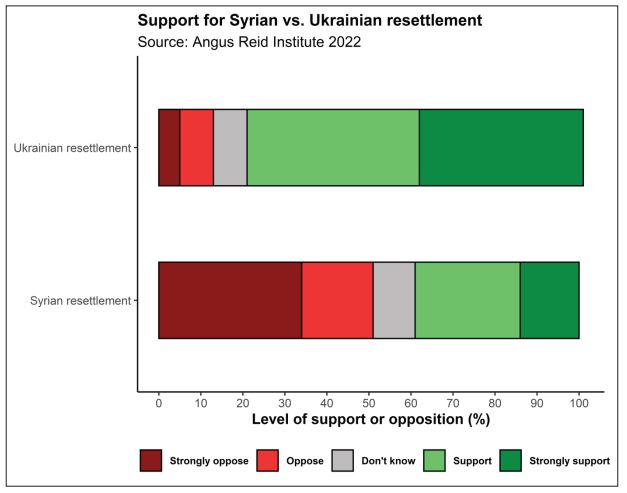Calgary study says barriers hinder Ukrainian refugees hoping to settle in Canada
Posted Aug 11, 2022 7:16 pm.
Last Updated Aug 11, 2022 8:03 pm.
A new Albertan study has found Canada’s immigration policies are creating extra hardships for Ukrainians fleeing their country from the Russian invasion.
The findings come despite Canada having the second largest population of Ukrainians outside of Ukraine and Russia themselves.
The University of Calgary study looked at a number of reasons why Canada is not welcoming as many as others. Robert Falconer, one of the researchers says the study could shed light on how Canada isn’t doing enough for refugees in general.
“What is our government’s capacity to meet goals? Especially in emergencies,” he said.
“I’m really worried right now that the federal government is really lacking when it comes to state capacity around emergencies like these. We’ve seen it with the fall of Kabul last August, when the U.S. withdrew from Afghanistan. We’ve seen it recently when Canada didn’t have a plan to evacuate its staff from the Kyiv embassy and were seeing it now with this Visa process,” Falconer said.
RELATED STORIES:
-
Calgary hosts rally in solidarity with war-torn Ukraine
-
Ukrainian risks her life to rescue wild animals from war
-
Russia bans, Inna Platonova, president of the Calgary Ukrainian Canadian Congress
On March 17, 2022, the federal government launched the Canada-Ukraine Authorization for Emergency Travel (CUET) — an expedited process for visas. Falconer points to other countries which have dropped visa requirements altogether and are accepting many more Ukrainians.
“Ireland chose to take a much more welcoming approach in making it easy for Ukrainians to arrive there, whereas Britain took one much more like Canada’s, where a visa is required to enter the country and we’ve seen, especially in the early days of the invasion, Ireland took 13 times more refugees than the UK did,” Falconer said.
The federal Liberals said in March an unlimited number of Ukrainians would be welcome in Canada, data from the Canadian Immigration policy and the Russo-Ukraine War study from the University of Calgary show a big difference in applications to approvals. It lists a difference of 331,000 applications submitted through CUET, with 142,000 having been approved.

Canada-Ukraine Authorization for
Emergency Travel (CUAET) graph showing applications received and approved from the Canadian Immigration policy and the Russo-Ukraine war study from the University of Calgary. (Robert Falconer/University of Calgary), March 17 – June 22, 2022
The opposition NDP has called for the visa requirement to be dropped. Falconer believes an administrative backup could be to blame.
“Our wider immigration system not having a clear objective to what it wants to accomplish whether that’s economic immigration, refugee, or family reunification right now, and as it relates to that this really big backlog of immigration applications that we’ve built up,” Falconer said.
The study also found 80 per cent of Canadians are willing to accept Ukrainian refugees compared to 40 per cent willing to accept Syrian refugees.

Support for Syrian vs. Ukrainian Resettlement graph from the Canadian Immigration policy and the Russo-Ukraine war study from the University of Calgary. (Robert Falconer/University of Calgary)
Iman Bukhari with the Canadian Cultural Mosaic Foundation said there should be no barriers for anyone fleeing crises, and more support when they arrive is needed.
“We’ve had so many folks reach out to us, Afghan refugees in particular, over the past few months saying, ‘[I] don’t have support, there’s no English classes, I don’t know how to get a job, I’m 9 months pregnant, I’m due this week, I have nothing for my baby, no government money has come in, I don’t know a single [word of] English and I don’t know what I’m going to do,'” Bukhari said.








